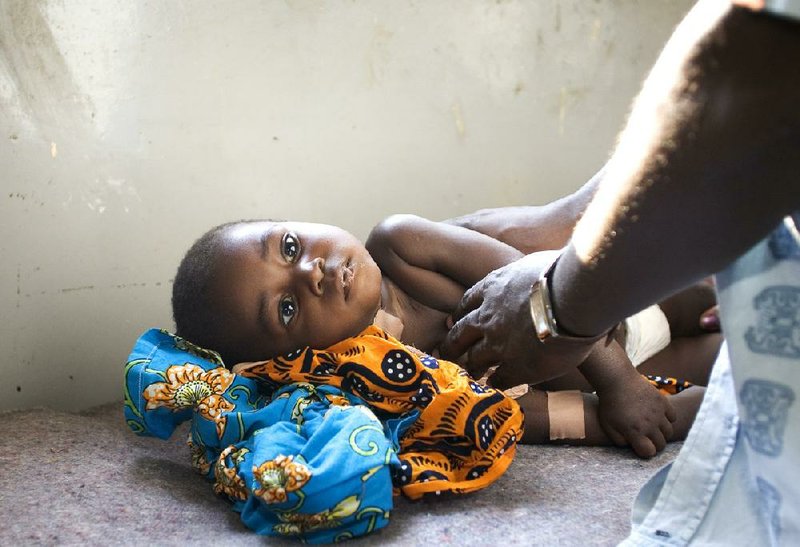LITTLE ROCK — Arkansas United Methodists are investing in the fight against malaria in a big way — with a $1 million fundraising goal.
The campaign is part of the denomination’s nationwide Imagine No Malaria initiative, which aims to raise $75 million. The objective is to eradicate the mosquito-borne illness that kills hundreds of thousands each year, said Martha Taylor, field coordinator for the Arkansas Conference of the United Methodist Church.
“We’re trying to involve every United Methodist Conference in the United States,” Taylor said.
The denomination is working in partnership with the World Health Organization; the Bill and Melinda Gates Foundation; the Global Fund to Fight AIDS, Tuberculosis and Malaria; and the United Nations Foundation to raise the money for education, prevention and treatment.
According to the World Health Organization, an estimated 655,000 people died from the treatable disease in 2010. The majority of deaths occurred in poor countries, with the continent of Africa being particularly affected. The organization states that 90 percent of deaths occurred in Africa and most of the dead were children under age 5.
“It’s needless. No one should die from malaria,” Taylor said.
The Imagine No Malaria initiative started in 2006 with the Nothing But Nets campaign to send mosquito bed netting to families living in affected areas. Bed nets are still being distributed as part of the Imagine No Malaria program, and Taylor said the nets have helped.
“In the six years we’ve been distributing nets we’ve reduced the number of deaths almost in half in sub-Saharan Africa,” she said. “It’s still one of the most effective preventive measures we can provide, but as time went on we realized there was more to be done.”
Now the outreach includes prevention, treatment and education. Taylor said community health workers are taught about the proper use of bed nets and the causes and treatment for malaria. Those workers return to their local communities and share information with their friends and neighbors. They also teach residents about the dangers of standing water as a breeding ground for mosquitoes and make sure people know where to receive treatment if they get sick.
“We’re revitalizing local health clinics and hospitals and working to have medicine available,” Taylor said. “Many times a mother will walk a long distance with her child only to find no medicine.”
Taylor said the disease doesn’t just affect individuals. Families and communities can be hit hard by the illness.
“The impact on communities is huge because someone can be affected over and over again,” she said. “They begin to feel ill and go to the clinic for treatment, and when they begin to feel better, they go home, and they haven’t actually been cured of the disease and they become ill again.”
Treatment costs can take a toll on the family when limited resources are spent paying medical bills instead of buying food or other necessities.
Imagine No Malaria is an important cause for David Freeman, executive pastor at First United Methodist Church in Springdale.
“It’s something I’ve been pretty passionate about and felt was important for a long time,” Freeman said.
The pastor has seen how malaria can devastate a family.
“I have a friend in Kenya and he and his wife have lost three children to malaria,” Freeman said. “Everyone he knows has had malaria.”
Freeman said his friend has a small farm, but the cost of fighting the illness repeatedly leaves him unable to do more than survive.
“Any profits he makes go to pay medical bills,” he said. “I see it so directly tied to poverty ... that a mosquito bite can lead to death or financial devastation keeps them trapped in poverty.”
Freeman said the goal isn’t to save Africa, it’s to empower the people and eradicate malaria and hopefully the poverty that comes with it.
“It’s so preventable and it is so curable,” he said. “I think about the fact that if I get bit by a mosquito it’s going to be an irritation for a few days, and if they get bit by a mosquito it can be a life sentence.”
Freeman has encouraged groups within the church to get involved in the initiative. One group is making Christmas ornaments to sell at the church’s annual alternative market next month as a way to raise money. Another is planning a 5K fundraising race for next year.
“I think for us this is where we take our mission global, where we can make a significant impact globally without having to travel globally,” Freeman said.
Taylor, who was named field coordinator for the campaign in August, has been traveling the state to spread the word. She said interest in the campaign has moved beyond United Methodist churches to community groups, civic organizations and schools.
“It’s getting to the point where I can’t handle all of the requests, so I have ambassadors all across the state, so if I get a request for a presentation and I can’t get to it I rely on them to help,” she said.
Taylor said Hendrix College in Conway is planning events for the spring, and Philander Smith College in Little Rock recently held four events to raise funds for Imagine No Malaria.
“One of the things that’s really neat about Imagine No Malaria is that 100 percent of every gift is given directly to the people,” she said. “All the administrative costs are covered by a grant through the Bill and Melinda Gates Foundation.”
Taylor said Arkansas donors can have an even bigger impact because of a grant from the United Methodist Foundation of Arkansas. The foundation has issued a matching grant of up to $333,333 so that every dollar raised by churches, individuals and groups will be matched.
“We really want to take advantage of that grant. It’s an exciting thing,” she said.
More information is available online at imaginenomalaria.org.
Religion, Pages 14 on 11/24/2012
